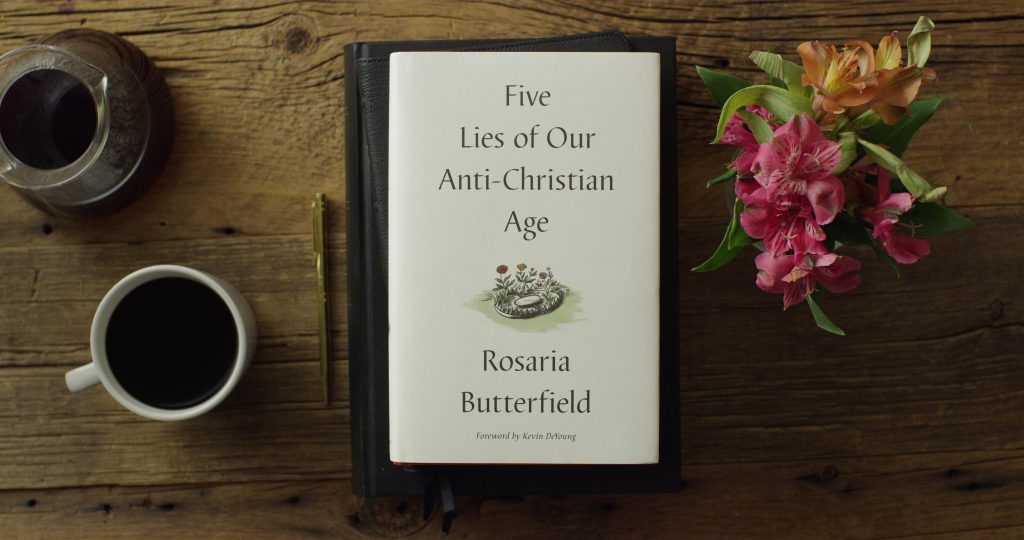
Five Lies of our Anti-Christian Age is a book by Rosaria Butterfield, through Crossway Publishing. (Pic: Crossway)
By Amy Butler
There’s something deeply refreshing about reading a commentator who is prepared to critique her own advice.
That’s what I got with my recent holiday read (actually, as an audio book), Five Lies of Our Anti-Christian Age by Rosaria Butterfield. It certainly wasn’t a relaxing read but, in the current climate, essential. It is essential for Bible-believing Christians to be challenged about where our thinking has been influenced by culture rather than God’s word. As a woman, it is essential to see where I have fallen prey to some of these lies, in ways which diminish both my contentment and my witness for Jesus. As a mother, it’s essential to seek wise and godly guidance on navigating our gender-fluid culture with my brood in tow.
Rosaria Butterfield is a trusted thinker, writer and commentator on culture, sexuality and the Bible from a Reformed theological perspective. For those unfamiliar with Rosaria’s story, she tells of her ‘trainwreck’ conversion in her book, Secrets of an Unlikely Convert.
The first thing which struck me about Five Lies was the way in which Rosaria humbly, and with deep self-reflection, critiques some of her own advice and commentary published in her previous works. Rosaria examines herself and is transparent with her readers about ways in which her own thinking has been compromised by those same lies.
I was fascinated by the title and was interested to see how Rosaria would narrow down the lies of our anti-Christian age to just five. In brief, the lies Rosaria examines are:
- Homosexuality is normal
- Being a spiritual person is kinder than being a biblical Christian
- Feminism is good for the world and good for the church
- Transgenderism is normal
- Modesty is an outdated burden that serves male dominance and holds women back
As a Christian living in the contemporary age, Rosaria’s book helped me to see how we compromise theology in order to save face, in a world which is scathing and dismissive of any sexual ethic other than the most modern. She sees an over-emphasis on empathy as the reason we go soft on biblical truth. I’m still thinking about this. The fact that I find it uncomfortable rests uneasily on my conscience. Either Rosaria is extreme and it’s okay to agree to disagree, or I’m more blinded by culture than I think.
This book reminded me of the insidious effects of the Fall, and how it plays out in a marriage. Much of the marital disharmony experienced, certainly in my home, can be traced to our failure to live out (or even remember) our biblical roles. God designed us to complement one another, rather than do battle. My husband is my protector; his job is to cherish me, and I can rest in that.
Another helpful takeaway was the importance of face-to-face relationships and the way I can personally disciple younger women, including my daughters, within my local community. The section on modesty helped me to think through my social media usage and whether I participate in a way that expresses modesty and humility. This could be a good litmus test for the way in which we (not just women) engage online.
I would encourage you to read this book in its entirety, but if you’re looking for some fast help – say, on what to do if your grandchild has reidentified from female to male – Rosaria has done a lot of the hard thinking, included in her afterword, on this and related issues. She draws a sharp distinction between acceptance and approval, then provides examples of how gospel love and acceptance manifests itself in action and attitude.
